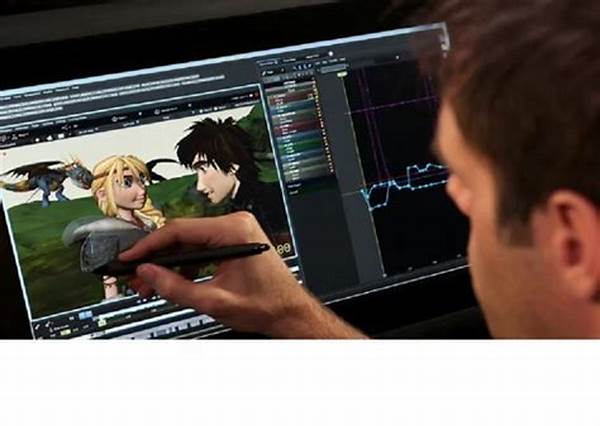Why Group Projects in History Education Rock
Listen up, folks! If you’ve ever struggled to stay awake in history class, it’s time to shake things up with group projects in history education. Think about it—no more snooze-fest lectures. Instead, you’re getting hands-on, diving deep into history with your pals by your side. When you’re in a group, you’re not just learning about history; you’re living it. You tackle real problems, share insane ideas, and together create a project that you’d be proud to show your grandkids. Group projects in history education are not just a trend; they’re a revolution. Embrace the chance to collaborate, debate, and question everything. After all, history isn’t just about the past; it’s about connecting it to our future. So why stick with the old-school approach when group projects offer a chance to flip the script and make history come alive?
Read Now : Chronological Storytelling In Animated Films
Perks of Group Projects in History Education
1. Collaborative Learning Boosts Engagement
Group projects in history education drive student engagement. When everyone contributes, learning becomes interactive and fun.
2. Develops Essential Life Skills
Working in a team enhances communication, critical thinking, and cooperation—skills you’ll need in real life.
3. Diverse Perspectives Add Value
Getting different viewpoints from your group can open your mind to new approaches and deeper understanding of history.
4. Creativity Skyrockets
Group projects foster creative solutions and unique approaches—you’re not just remembering dates; you’re crafting history.
5. Shared Success Feels Awesome
Achieving a common goal in a group project can be incredibly fulfilling, boosting your confidence and team spirit.
The Invaluable Experience of Group Projects in History Education
Doing group projects in history education is an eye-opener, trust me. Imagine diving headfirst into the annals of history with a team that’s as jazzed about the past as you are. You build something amazing together—a project that’s not just informative but also creative and engaging. It’s not just about presenting facts but about crafting a narrative that resonates with your classmates. You’re not just students but historians piecing together stories from the past with fresh perspectives. Through these projects, you’re suddenly aware of how history shapes today—and why it matters. Plus, embracing group projects in history education enriches your understanding and appreciation of different cultures and events. Let’s face it, understanding history from textbooks alone is like trying to appreciate an art gallery through a catalogue. Group projects, on the other hand, place you amidst the brushstrokes of history, making time travel feel possible. With every project, you’re redefining how history’s taught, one collaborative effort at a time.
Mastering Group Projects in History Education
1. Start With a Solid Plan
A clear roadmap is essential. Know your goals and the steps to get there.
2. Communicate Openly and Often
Keep everyone in the loop. Clear communication prevents misunderstandings and keeps the project on track.
3. Play to Your Strengths
Every group member brings something unique. Use those strengths to create a well-rounded project.
4. Respect Deadlines
Read Now : “animated Series For Young Learners”
Meeting deadlines is crucial for maintaining momentum and reducing stress.
5. Stay Flexible
Be ready to adapt. Changes and challenges are part of the process, but they can lead to better results.
6. Draw Inspiration from Diverse Sources
Look beyond the textbook. Use documentaries, interviews, and other resources for a richer project.
7. Embrace Feedback
Constructive criticism can improve the project. Encourage and accept feedback from both within and outside the group.
8. Balance Workloads
Ensure that tasks are distributed evenly so that each group member contributes significantly.
9. Think Critically
Analyze your work. Challenge assumptions, and make sure your project is robust and well-researched.
10. Celebrate Success
Once you’ve nailed it, take time to celebrate the treasure you’ve crafted together.
The Ripple Effect of Group Projects in History Education
People often underestimate the impact of participating in group projects in history education. It’s not just about completing a task but about the ripple effect it creates in a learning environment. Engaging in these projects fosters a sense of unity—a shared pursuit of knowledge that bonds the group. It’s these projects that often ignite a lifelong passion for history, encouraging students to dig deeper beyond the pages of their textbooks. Through collaboration, exploration, and debate, students are trained to undertake challenges, to learn not just from books, but from one another. The skills and interests developed during these projects extend far beyond the classroom, paving the path for inquisitive minds eager to understand the past to shape a better future.
Skills and Growth Through Group Projects in History Education
Delving into group projects in history education doesn’t just prepare you academically—it prepares you for life. Each project pulls you into its narrative, stretching your imagination and critical thinking skills. You’re not just memorizing events; you’re understanding causations and implications. The group dynamic builds patience, empathy, and leadership qualities. You’re learning to compromise, to stand your ground, and most importantly, to listen. The lessons you learn from these projects go beyond battle dates or political upheavals. They teach you about conflict resolution, managing differences, and cherishing diversity. Your ability to collaborate deeply in these settings shapes your understanding and respect for cultures and times you’ve never lived in.
Group Projects in History Education: A Paradigm Shift
In conclusion, group projects in history education aren’t just a cool initiative—they’re a necessary shift in educational paradigms. History isn’t just about rote learning; it’s about exploring lanes walked for millennia, and these assignments are the map to do so. Through group projects, students aren’t just participants in a class; they’re protagonists in the pages of history. These collaborations ignite an insatiable curiosity and instill skills that transcend academic pursuits. Ultimately, through group projects, students learn that history is a living, breathing entity, not just a recording of past events. Let’s champion the cause for group projects in history education—after all, transformative learning starts when teamwork makes history happen.



